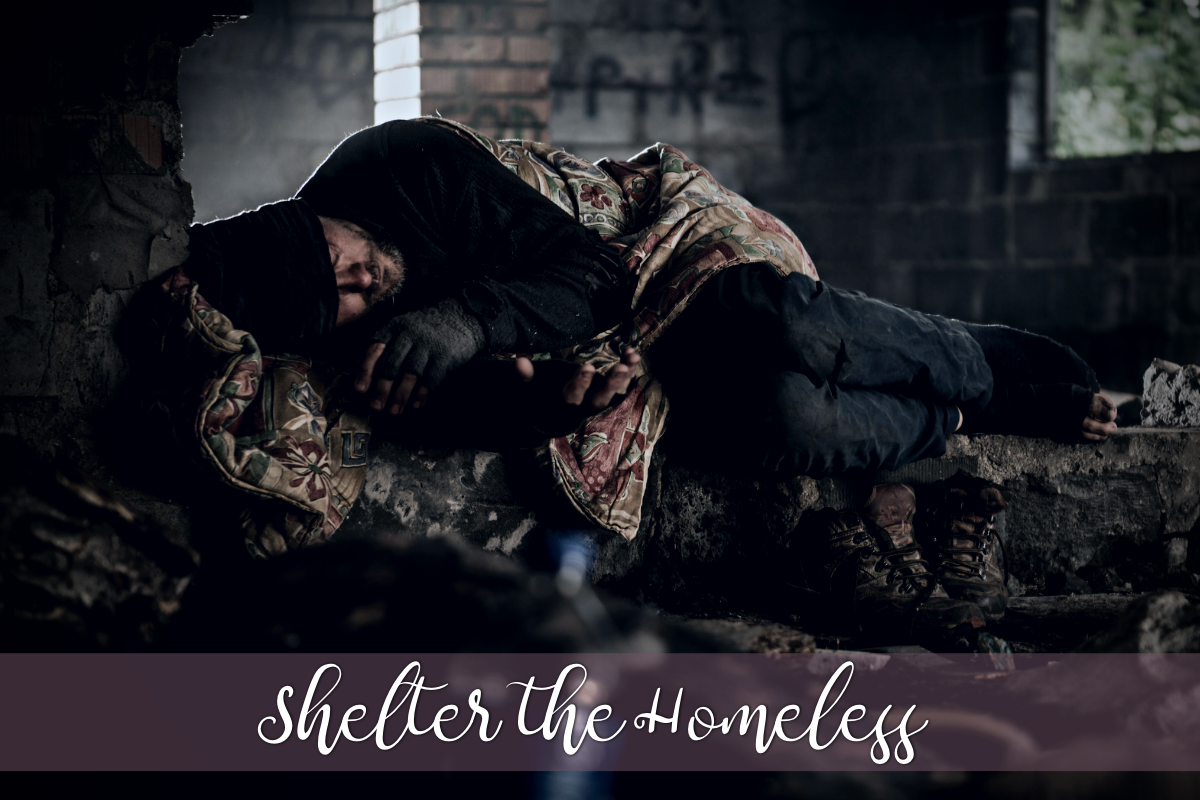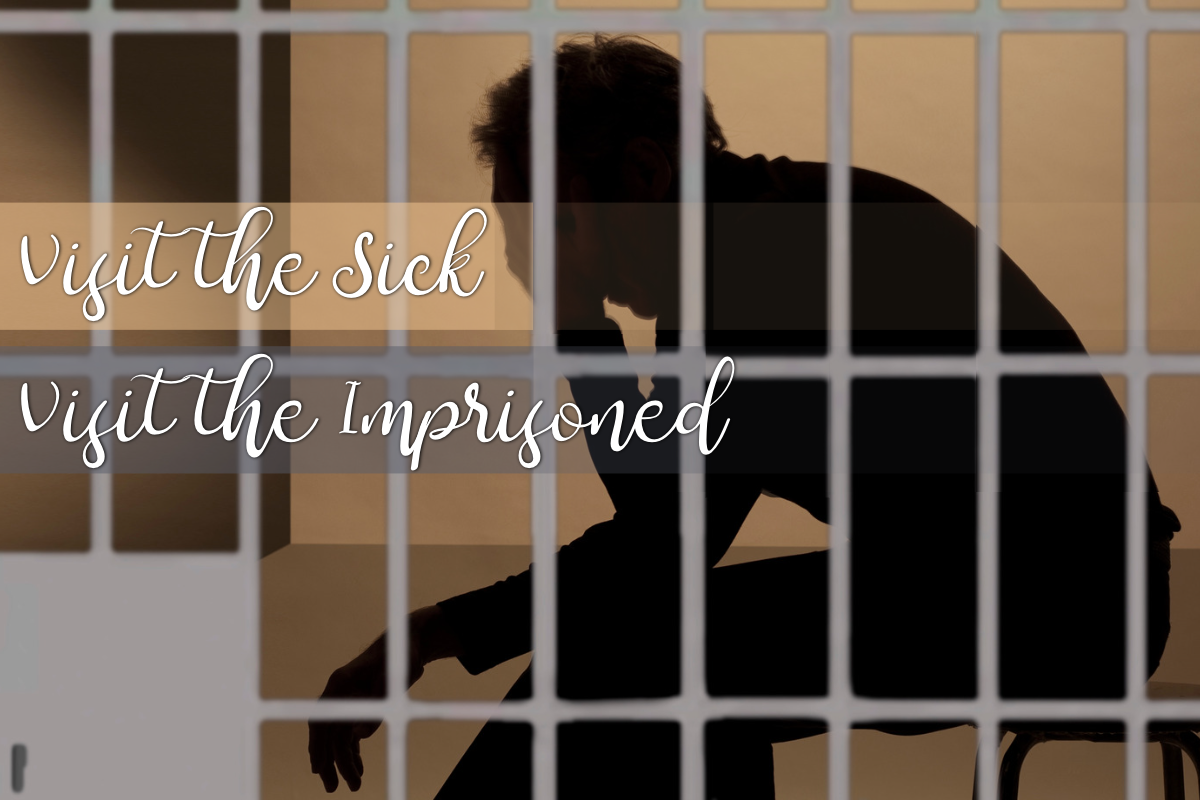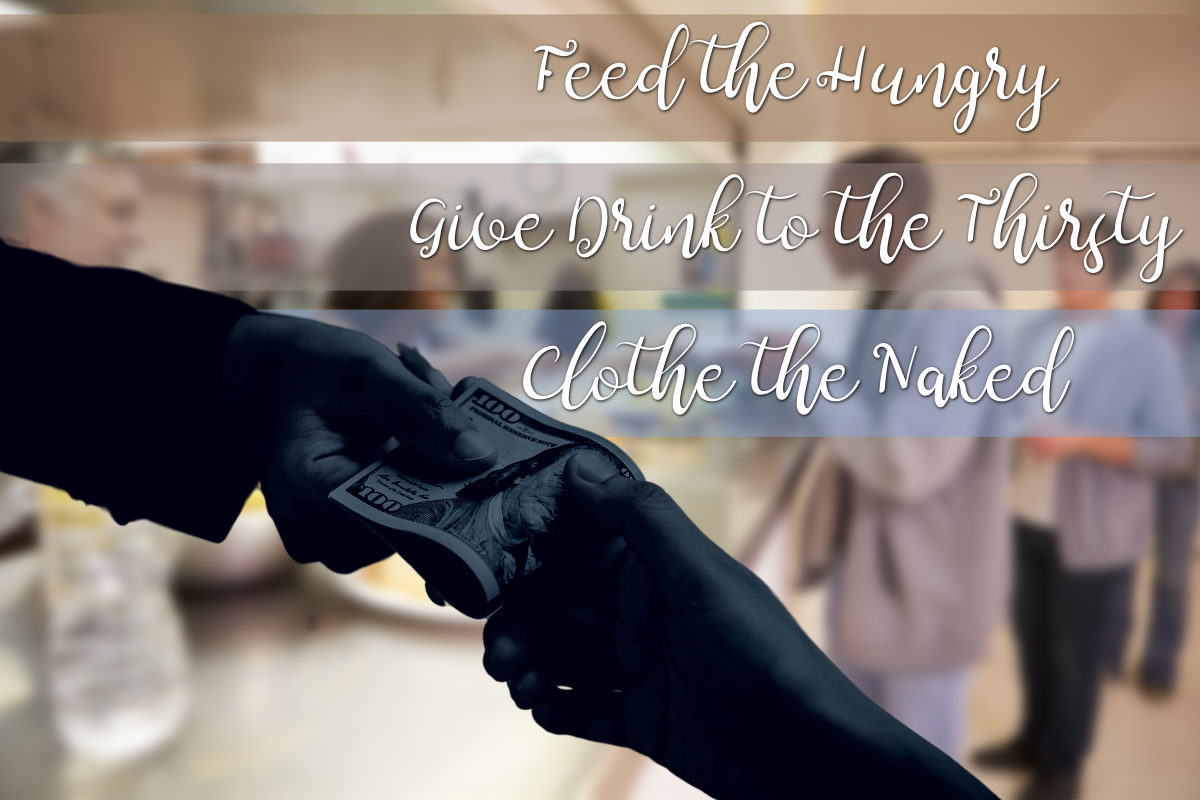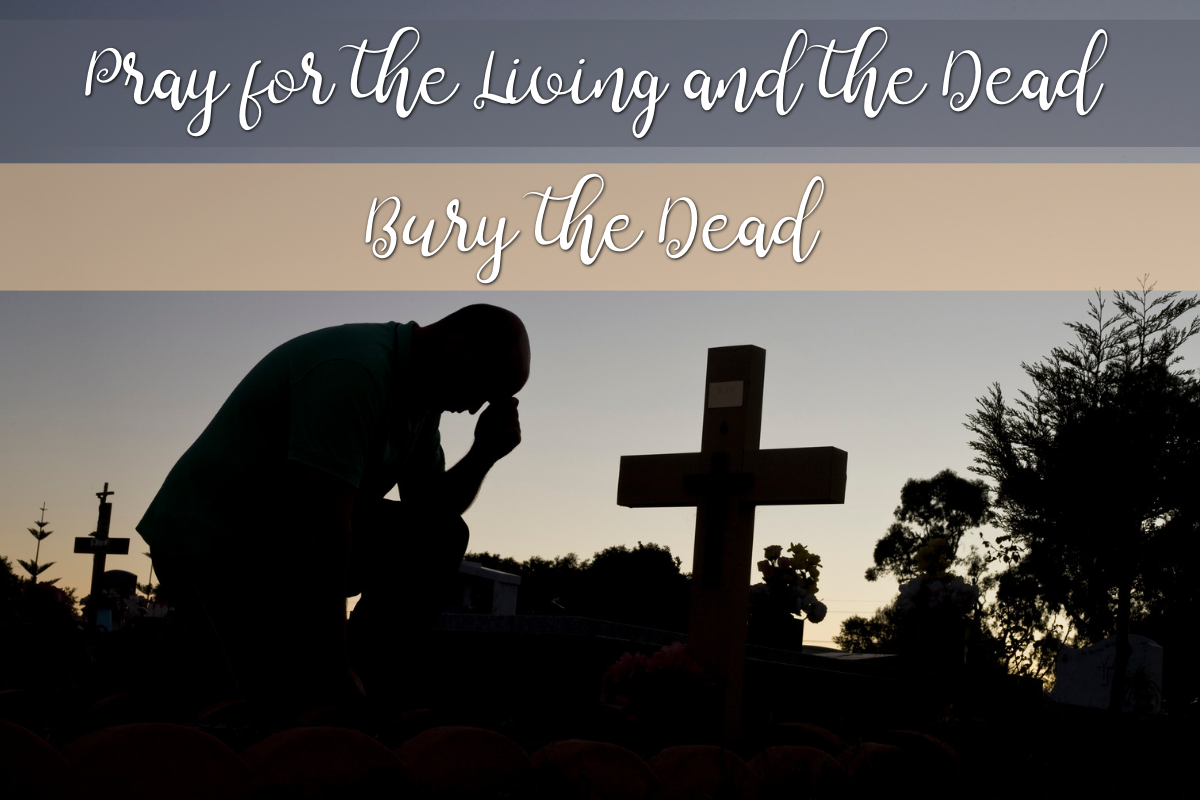"Weekly Challenge" March 2023

Week Beginning March 26, 2023
Shelter the Homeless
From the time of his birth in a borrowed stable with a manger for a crib, Jesus Christ understood the plight of those without a permanent roof over their heads. His family fled from their home when he was young, his public ministry had no fixed address, and he was buried in another man’s grave. “Foxes have dens and birds of the sky have nests, but the Son of Man has nowhere to rest his head” (Luke 9:58). Jesus suffers in solidarity with the poor and the vulnerable. Of those we serve through the corporal works of mercy, the homeless clearly reveal the face of Jesus.
Mercy does not judge and condemn others; rather it affirms our humanity, unites us together, and helps us relate to one another. When we see the homeless struggling, our inclination should not be to blame or shame, but to appreciate the trauma and circumstance that precedes the situation. Our call for the homeless is to help, to heal, to hold, and to harbor.
Note that early accounts of the corporal works of mercy refer to this act as harboring the harborless. Literally, that means guiding weary sailors to a safe haven or place of refuge away from the turbulent seas. Today, we still seek to direct our homeless from life’s stormy elements and protect them from harsh weather, crime, illness, and other dangers associated with life on the street.
By creating a sense of belonging, we can help to restore dignity to those who may be forgotten or marginalized by society. When we shelter the homeless, we are not just providing them with a roof. We are creating a space where they can feel secure, respected, and valued. By giving them the opportunity to rest, recover, and rebuild their lives, we nurture their human spirit and help them rediscover their sense of worth. We provide hope through emotional and spiritual support. We strengthen our communities by helping to break the cycle of poverty, isolation, and despair.
The Gospel reference for sheltering the homeless comes from the Sermon on the Last Judgement: “For I was…a stranger and you welcomed me” (Matthew 25:35). One place we can easily welcome the stranger is at our parish. Offering basic hospitality helps the spiritually homeless feel comfortable and accepted as part of our church family. Too many people do not attend services because they do not experience that genuine connection. When you open your hearts every time you open your church doors, you help others open their minds to Christ.
This week, reflect upon how you can safely help the homeless. The following list offers a few suggestions.
Treat the homeless you encounter with respect. Provide them with resources when applicable. Offer to pray with them. If engagement is dangerous, pray instead silently for them.
Volunteer for or financially support an organization that builds homes for or awards homes to people in need. Volunteer for or financially support a shelter for homeless, veterans, refugees, unwed mothers, storm victims, abuse victims, drug addicts, mentally ill, or otherwise challenged people.
Donate household goods to help the recipients live comfortably or toys to delight underprivileged children. Organize a drive to raise funds or collect supplies for those in need. Make and distribute “care packages” for the homeless.
Support the efforts of your parish, diocese, Catholic Charities, and Catholic Relief Services to combat homelessness here and abroad.
Consider hosting someone who needs temporary housing, such as a religious pilgrim, guest speaker at your church or school, or clergy member.
Share your tools and time with neighbors who need assistance with home repairs.
Volunteer to serve on the hospitality committee or to usher at your church. Introduce yourself to newcomers. Invite the people in the pews to attend events and join ministries. Ask others to accompany you to church.
Advocate for fair and affordable housing laws. Advocate for safe and humane immigration and refugee policies. Help those who are unjustly facing eviction or deportation. Help to combat the root causes of homelessness, such as poverty, sudden economic distress, mental illness, drug addiction, and more. Seek government prudence and transparency regarding use and disbursement of funds allocated for social services.
“Do not neglect hospitality, for through it some have unknowingly entertained angels” (Hebrews 13:2).

Week Beginning March 19, 2023
Visit the Sick, Visit the Imprisoned
“For I was…ill and you cared for me, in prison and you visited me” (Matthew 25:35-36). This week, we review the corporal works of mercy to visit the sick and imprisoned. These two acts of compassion make us present to those who are struggling. Our encouragement gives them strength and motivation. Our companionship relieves their loneliness and isolation. Our love validates the inherent value of their lives. Our support demonstrates they are not defined by their circumstances. Saint Padre Pio of Pietrelcina says, “In order to console a soul in its sufferings, point out to it all the good it can still do.”
It is heartbreaking to witness our cherished ones bear the hardships of illness and confinement. By placing the feelings of others above our own and making these meaningful visits, we achieve personal growth through empathy and humility. We also gain appreciation for the health and freedom with which we are blessed.
Visiting the sick challenges us to confront our own mortality and to consider the fragility of life. It reminds us that we are all vulnerable, and our lives on this earth are fleeting. Visiting the incarcerated requires that we place our judgements aside. It reminds us that we are all sinners, and we eventually pay for our transgressions.
Most importantly, visiting the sick and imprisoned reminds us that we are all members of the same human family, and we are responsible to care for each other. We may feel uncomfortable and helpless. But, even the smallest act of kindness can make a profound difference in the life of someone experiencing hardship.
When we shine the light of Christ during their darkest hours, we bring the hope they need to endure their trials. Pope Francis explains: “the sick and the imprisoned live a condition that limits their freedom. It is in fact when the latter is lacking that we realize how precious it is! Jesus has given us the possibility to be free despite the limitations of sickness and of restrictions. He offers us the freedom that comes from our encounter with Him and from the new sense that this encounter leads to our personal condition.”
For this reason, we must not forget the spiritually sick and imprisoned. Our Sunday Gospel reading this week recounts the story of a blind man healed by Jesus (John 9:1-41). So many people remain spiritually blind to the light of the Lord, unable to see how to live in Christ. Others are trapped inside the invisible walls of fear, anxiety, depression, mental health issues, addiction, emotional pain, and past regrets that hold them captive and separate them from the mercy of God. We need to share the healing power of Jesus Christ to open their eyes and free them from sin and doubt. True freedom and redemption are possible when we break down those walls of despair that keep them locked in the darkness.
This week, reflect upon how you can help the sick and imprisoned. Even if you encounter restrictions to access entry into healthcare institutions and correctional facilities, you can still lend support. Check to see if your local diocese has a prison ministry where you can correspond with the incarcerated. Volunteer for or donate to a charity that provides meals for the homebound, holiday gifts for children of prisoners, transportation to medical appointments, respite time for caregivers, rehabilitative employment coaching, or other relevant services. Advocate for patient rights, medical ethics that respect the sanctity of life, and a justice system that is truly just, merciful, and restorative. Visit elderly neighbors and relatives. Extend your help with shopping or setting up technology to stay connected. Check on sick friends and associates who are having problems. Pray with them, and suggest helpful resources for their benefit. Remember that we have one mouth and two ears; sometimes simply listening to others is enough to comfort them. Saint Francis of Assisi observes: “The deeds you do may be the only sermon some persons will hear today.” Preach with your feet, and visit those in need.

Week Beginning March 12, 2023
Feed the Hungry, Give Drink to the Thirsty, Clothe the Naked
This week, we reflect upon the three corporal works of mercy that involve providing tangible necessities to the needy: feeding the hungry, giving drink to the thirsty, and clothing the naked. You may notice some accounts of the corporal works refer to the latter as giving alms to the poor. These acts are a means to express God’s love for the less fortunate. They reflect the belief that Christ is present in those who are struggling. Jesus reminds us: “The poor you will always have with you; but you will not always have me” (Matthew 26:11). Through these words, he affirms the inherent value of every human life created in the image of God.
Food and drink are fundamental requirements vital for all life. Clothing comforts us and protects us from the harsh elements. Although we live in a world of abundance, we also live in a world of poverty. In an instant, tragedy could strike and our circumstances could change. We don’t have to look far to see that many of our brothers and sisters suffer from starvation or food insecurity; many lack access to clean drinking water and other essentials. When we search for the “naked” in our community, we also include those who are not clothed adequately–such as a children with ill-fitting shoes, homeless wearing filthy tatters, or strangers without coats–as well as those stripped bare of meaningful relationships.
There are many ways we can help those in need. It can be as simple as basic hospitality by offering someone a drink on a hot day, bringing a meal to a neighbor who is having a hard time, or dressing your children and elderly grandparents. Other common ways to perform these corporal works of mercy include:
cleaning out our closets and pantries and donating the goods that we are not using
financially supporting or volunteering at food pantries, soup kitchens, thrift stores, and other service institutions
organizing or participating in fundraisers and collection drives for food and clothing
becoming better stewards of our resources through conservation and minimizing waste
advocating for policies that address poverty, agricultural efforts, and clean water initiatives.
Performing these acts involves giving not only what is in our hands, but also what is in our hearts. In addition to furnishing basic goods, we spread charity, kindness, and compassion to those who are often overlooked and neglected. When we give to the poor, we offer hope, dignity, and a sense of belonging.
The Catechism of the Catholic Church places high value on almsgiving: “Among all these, giving alms to the poor is one of the chief witnesses to fraternal charity: it is also a work of justice pleasing to God” (CCC 2447). When we recognize that everything we enjoy is a gift from God on loan from Him for our benefit, we understand that it is our responsibility to share that bounty with others the way God shares it with us. We are not isolated individuals, but rather interconnected members of a larger community. The well-being of one person is intimately tied to the well-being of all. In this way, the Church relates our charitable works to works of justice and witnesses to fraternity.
Giving to others enables us to practice humility and self-emptying. By focusing on the needs of others, almsgiving helps us detach from material possessions. It frees us to contribute to the mission of the Church and to properly order our lives toward God. We deepen our own spiritual journey when we become part of God’s plan to bring hope and healing to our broken world. Saint Francis of Assisi observes that “it is in giving that we receive.”
In the spirit of Lent, challenge yourself this week to be charitable beyond your comfort zone. Consider contributing in a different way, or develop a new habit of generosity. For example, every time you buy yourself an item of clothing, donate an item of clothing. Or give up a small indulgence every week, and donate the money you would have spent on that treat.
Saint Teresa of Calcutta teaches us: “A sacrifice to be real must cost, must hurt and must empty ourselves. Give yourself fully to God. He will use you to accomplish great things on the condition that you believe much more in His love than in your weakness.” Remember that when we share our blessings, we are asked to give from our substance, not our surplus (Mark 12:41-44). Take an honest look at what you are doing. Are you giving your fair share?

